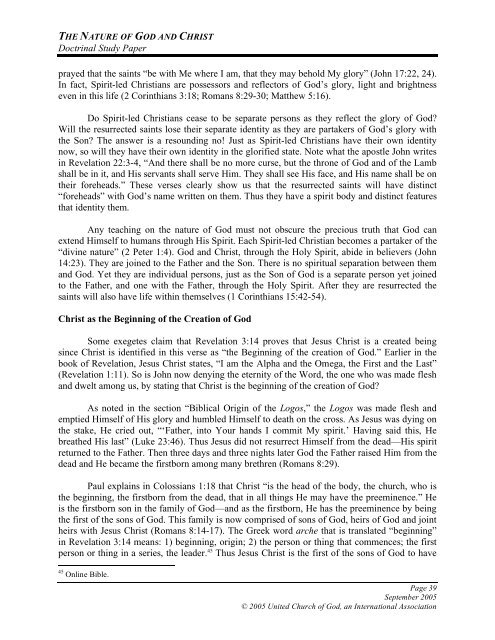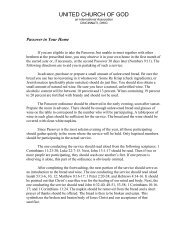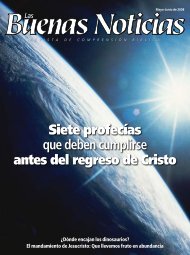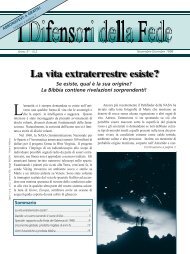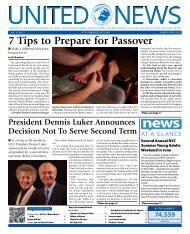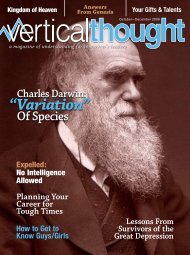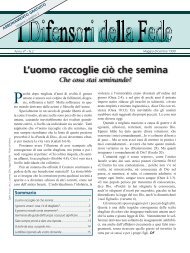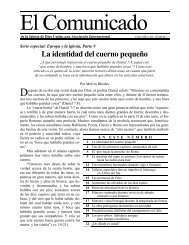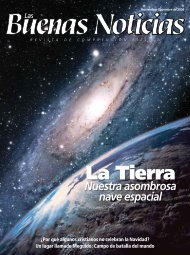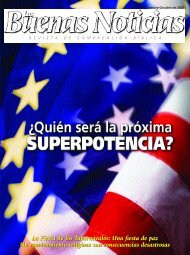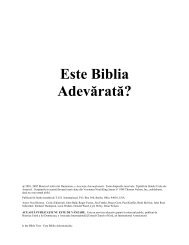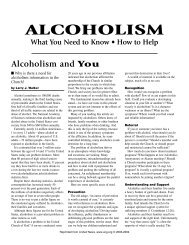The Nature of God and Christ - Members Site - United Church of God
The Nature of God and Christ - Members Site - United Church of God
The Nature of God and Christ - Members Site - United Church of God
- No tags were found...
Create successful ePaper yourself
Turn your PDF publications into a flip-book with our unique Google optimized e-Paper software.
THE NATURE OF GOD AND CHRISTDoctrinal Study Paperprayed that the saints “be with Me where I am, that they may behold My glory” (John 17:22, 24).In fact, Spirit-led <strong>Christ</strong>ians are possessors <strong>and</strong> reflectors <strong>of</strong> <strong>God</strong>’s glory, light <strong>and</strong> brightnesseven in this life (2 Corinthians 3:18; Romans 8:29-30; Matthew 5:16).Do Spirit-led <strong>Christ</strong>ians cease to be separate persons as they reflect the glory <strong>of</strong> <strong>God</strong>?Will the resurrected saints lose their separate identity as they are partakers <strong>of</strong> <strong>God</strong>’s glory withthe Son? <strong>The</strong> answer is a resounding no! Just as Spirit-led <strong>Christ</strong>ians have their own identitynow, so will they have their own identity in the glorified state. Note what the apostle John writesin Revelation 22:3-4, “And there shall be no more curse, but the throne <strong>of</strong> <strong>God</strong> <strong>and</strong> <strong>of</strong> the Lambshall be in it, <strong>and</strong> His servants shall serve Him. <strong>The</strong>y shall see His face, <strong>and</strong> His name shall be ontheir foreheads.” <strong>The</strong>se verses clearly show us that the resurrected saints will have distinct“foreheads” with <strong>God</strong>’s name written on them. Thus they have a spirit body <strong>and</strong> distinct featuresthat identity them.Any teaching on the nature <strong>of</strong> <strong>God</strong> must not obscure the precious truth that <strong>God</strong> canextend Himself to humans through His Spirit. Each Spirit-led <strong>Christ</strong>ian becomes a partaker <strong>of</strong> the“divine nature” (2 Peter 1:4). <strong>God</strong> <strong>and</strong> <strong>Christ</strong>, through the Holy Spirit, abide in believers (John14:23). <strong>The</strong>y are joined to the Father <strong>and</strong> the Son. <strong>The</strong>re is no spiritual separation between them<strong>and</strong> <strong>God</strong>. Yet they are individual persons, just as the Son <strong>of</strong> <strong>God</strong> is a separate person yet joinedto the Father, <strong>and</strong> one with the Father, through the Holy Spirit. After they are resurrected thesaints will also have life within themselves (1 Corinthians 15:42-54).<strong>Christ</strong> as the Beginning <strong>of</strong> the Creation <strong>of</strong> <strong>God</strong>Some exegetes claim that Revelation 3:14 proves that Jesus <strong>Christ</strong> is a created beingsince <strong>Christ</strong> is identified in this verse as “the Beginning <strong>of</strong> the creation <strong>of</strong> <strong>God</strong>.” Earlier in thebook <strong>of</strong> Revelation, Jesus <strong>Christ</strong> states, “I am the Alpha <strong>and</strong> the Omega, the First <strong>and</strong> the Last”(Revelation 1:11). So is John now denying the eternity <strong>of</strong> the Word, the one who was made flesh<strong>and</strong> dwelt among us, by stating that <strong>Christ</strong> is the beginning <strong>of</strong> the creation <strong>of</strong> <strong>God</strong>?As noted in the section “Biblical Origin <strong>of</strong> the Logos,” the Logos was made flesh <strong>and</strong>emptied Himself <strong>of</strong> His glory <strong>and</strong> humbled Himself to death on the cross. As Jesus was dying onthe stake, He cried out, “‘Father, into Your h<strong>and</strong>s I commit My spirit.’ Having said this, Hebreathed His last” (Luke 23:46). Thus Jesus did not resurrect Himself from the dead—His spiritreturned to the Father. <strong>The</strong>n three days <strong>and</strong> three nights later <strong>God</strong> the Father raised Him from thedead <strong>and</strong> He became the firstborn among many brethren (Romans 8:29).Paul explains in Colossians 1:18 that <strong>Christ</strong> “is the head <strong>of</strong> the body, the church, who isthe beginning, the firstborn from the dead, that in all things He may have the preeminence.” Heis the firstborn son in the family <strong>of</strong> <strong>God</strong>—<strong>and</strong> as the firstborn, He has the preeminence by beingthe first <strong>of</strong> the sons <strong>of</strong> <strong>God</strong>. This family is now comprised <strong>of</strong> sons <strong>of</strong> <strong>God</strong>, heirs <strong>of</strong> <strong>God</strong> <strong>and</strong> jointheirs with Jesus <strong>Christ</strong> (Romans 8:14-17). <strong>The</strong> Greek word arche that is translated “beginning”in Revelation 3:14 means: 1) beginning, origin; 2) the person or thing that commences; the firstperson or thing in a series, the leader. 45 Thus Jesus <strong>Christ</strong> is the first <strong>of</strong> the sons <strong>of</strong> <strong>God</strong> to have45 Online Bible.Page 39September 2005© 2005 <strong>United</strong> <strong>Church</strong> <strong>of</strong> <strong>God</strong>, an International Association


